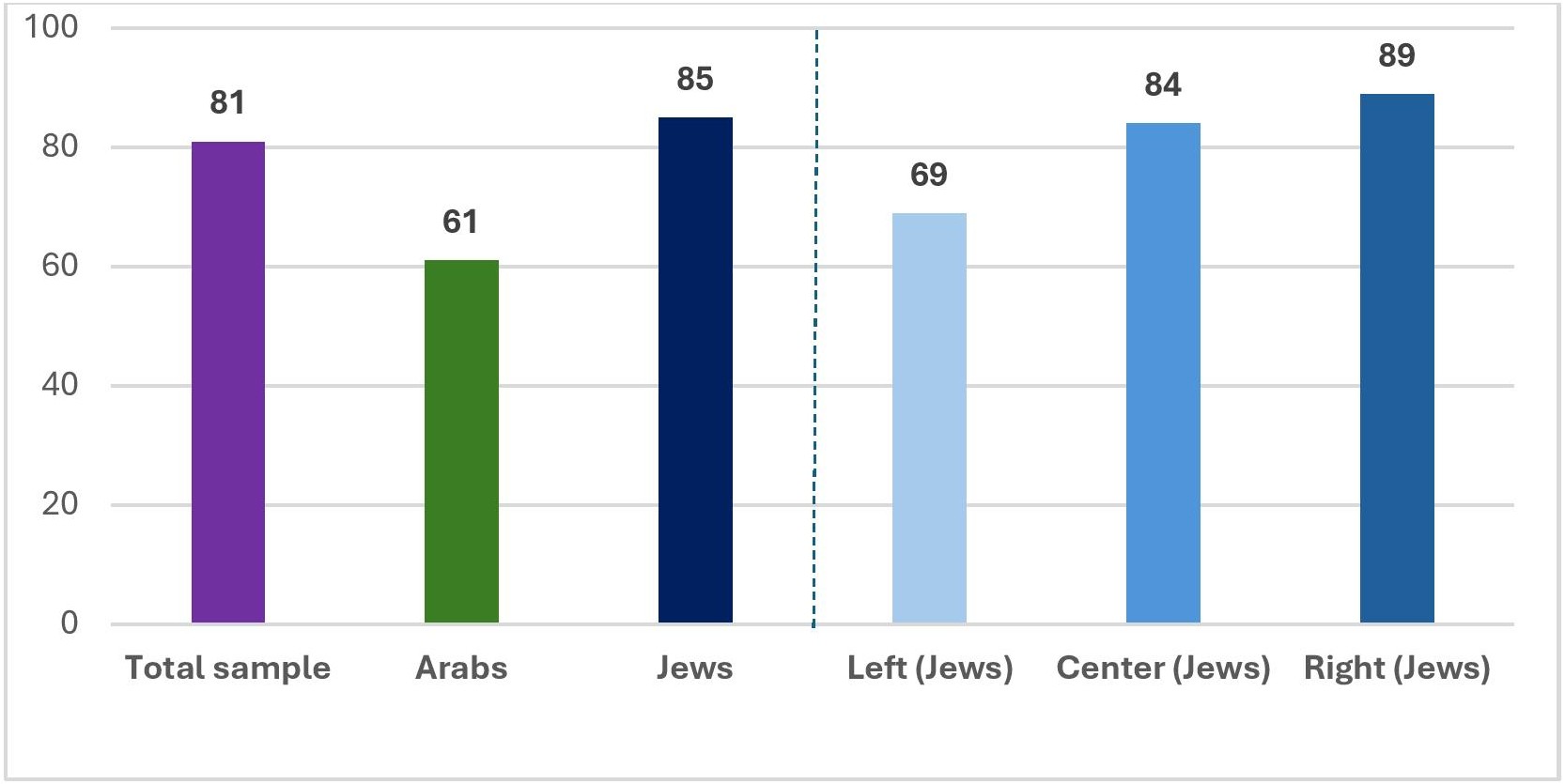Flash Survey on the Agreement to End the War and Release the Hostages

Photos by FLASH90
Methodology
The survey was carried out by the Viterbi Family Center for Public Opinion and Policy Research at the Israel Democracy Institute. It was conducted over the internet between October 19–21, 2025, with 600 male and female participants interviewed in Hebrew and 148 in Arabic, constituting a representative sample of the population in Israel aged 18 and above. The maximum sampling error was ±3.58% at a confidence level of 95%. Field work was carried out by iPanel.
- The deal for the return of the hostages and the ceasefire led to a significant improvement in the national mood. In August 2025, a large majority of respondents defined the national mood as fairly poor or very poor (total sample, 71%; Jews, 73%; Arabs, 58%). In the current survey, a majority of the total sample (57.5%) characterized the national mood as fairly good or very good.
- The disparity between Jews and Arabs is considerable: In the Jewish sample, the proportion who offer a positive evaluation of the national mood reached 60%, whereas the corresponding share in the Arab sample was less than half (46%).
- The differences between the political camps (Jews) are large: on the Left, only a minority define the national mood as fairly or very good (33%), compared with half of those in the Center, and the majority of those on the Right (70%).
Define the national mood today as fairly good or very good (%)
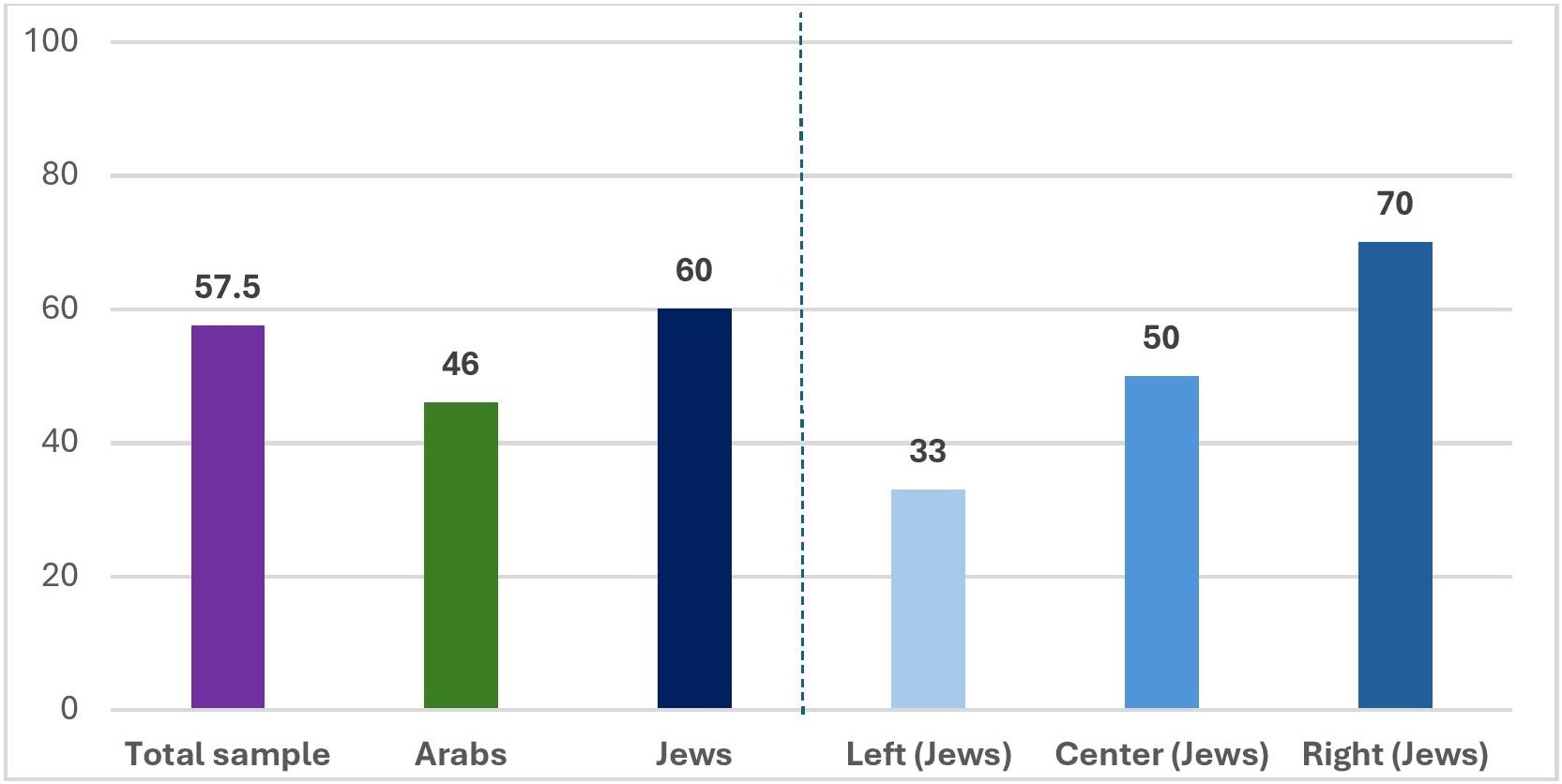
We asked our respondents to what extent they think that various factors contributed or did not contribute to the agreement to end the war and release the hostages and the Palestinian prisoners.
- President Trump is the big winner, with 95% of the total sample (97% of Jews and 86.5% of Arabs) of the opinion that the US president contributed somewhat or very much to the agreement. Segmentation by political orientation (Jews) reveals a rare consensus among the camps regarding Trump’s positive contribution: Left, 94%; Center, 98%; Right, 97%.
- Pressure by the IDF in the Gaza Strip is perceived as the second most significant factor in terms of contribution to the agreement, cited by a large majority of Jews (87%), though only a minority of Arabs (31%). Breaking down the Jewish sample by political orientation reveals large shares in all three camps who think that IDF pressure made a significant contribution, particularly on the Right (94%) and in the Center (84%). On the Left, this majority is smaller (63%).
- Pressure from the hostages’ families is seen as the third most significant factor, with 61.5% of the total sample saying that it contributed to the agreement. Interestingly, the share of Arabs who take this view (72%) is larger than the corresponding share of Jews (59%). A breakdown by political orientation (Jews) reveals that large proportions of those on the Left and in the Center think that pressure from the families was significant (81% in both camps), compared to less than half on the Right (48%).
- Prime Minister Netanyahu is perceived as having contributed somewhat or very much to the agreement by only around half of the general public (51%). In contrast to President Trump, whose contribution is recognized by a full national consensus, we found large differences between different groups in the public regarding Netanyahu. Thus, 58% of Jews think that he made a sizable contribution, compared with only 16% of Arabs. A breakdown by political orientation (Jews) also reveals significant differences: a majority of 75% on the Right gave a positive assessment of the prime minister’s contribution, compared with a minority of 38% in the Center and only 16% on the Left.
- Finally, about half of the Israeli public (49.5%) perceive the public demonstrations as contributing to the implementation of the agreement and the return of the hostages (Jews, 46%; Arabs, 68%). Here, too, a majority of Jewish respondents on the Left (80%) and in the Center (70.5%) have a positive view of the contribution of the demonstrations, compared with only a minority on the Right (30%).
To what extent did each of the following contribute or not contribute to reaching the agreement to end the war and release the hostages? (total sample; %)
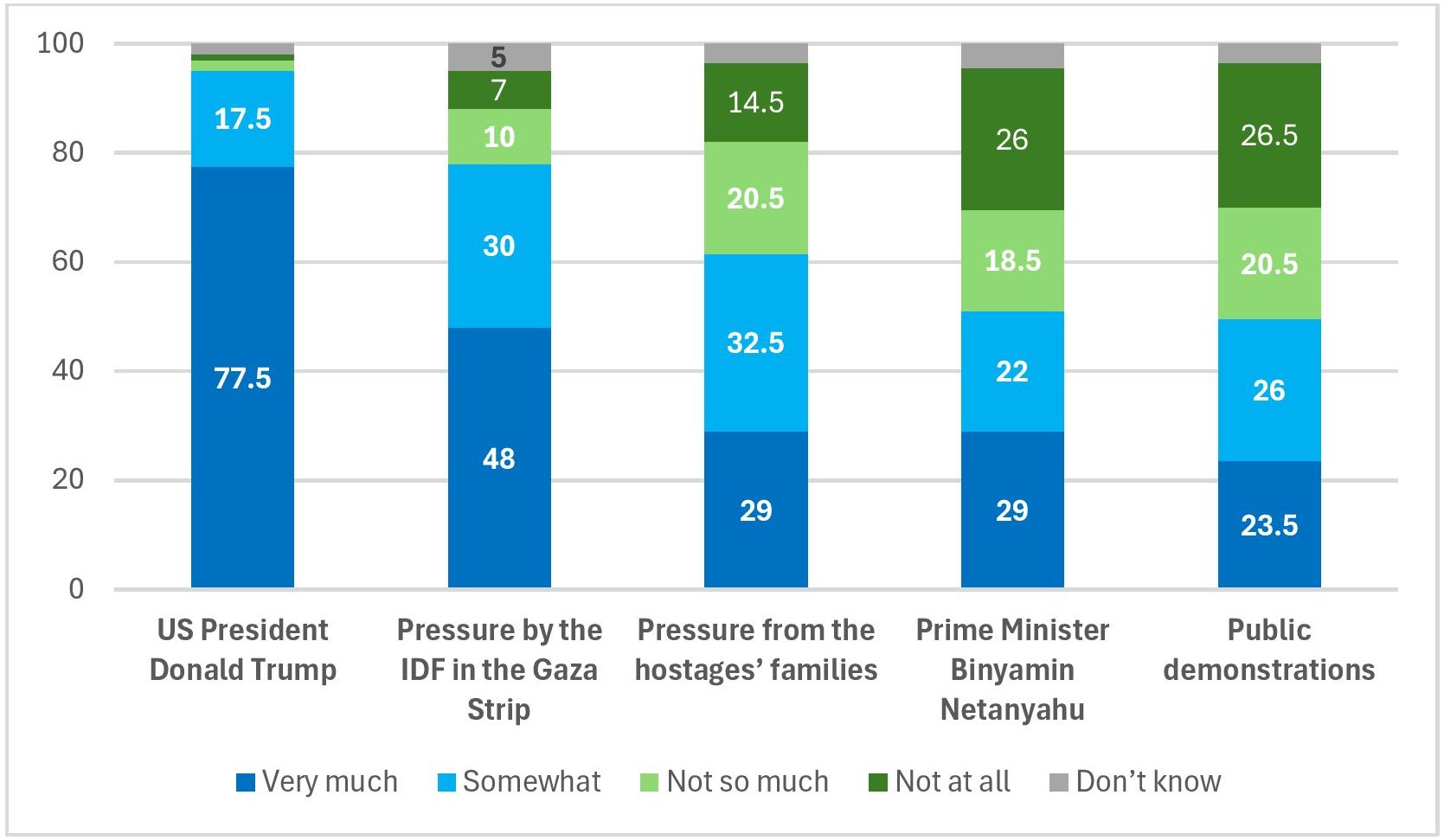
- In the total sample, we examined the relation between assessments of the contribution of the public demonstrations to the agreement and assessments of the contribution of Prime Minister Netanyahu, and found a strong association: 70% of those who think that Netanyahu contributed somewhat or very much to the agreement think that the demonstrations contributed not so much or not at all; and conversely, 76% of those who think that Netanyahu contributed not so much or not at all to the agreement think that the demonstrations contributed somewhat or very much. In other words, these responses largely mirror respondents’ political views.
- In all Jewish groups, the largest share of respondents believe that Israel’s interests were better served by the first stage of the agreement, but this share amounts to around half or even less in each group. In the Jewish sample as a whole, this view is held by 51% of respondents, but by only 37% on the Left, 51% in the Center, and 54% on the Right.
- Among Arab respondents, the largest share (50%) believe that Israel and Hamas have had their interests served to a similar extent.
Whose interests were better served by the first stage of the agreement, which includes ending the fighting, returning the hostages, and releasing Palestinian prisoners? (%)
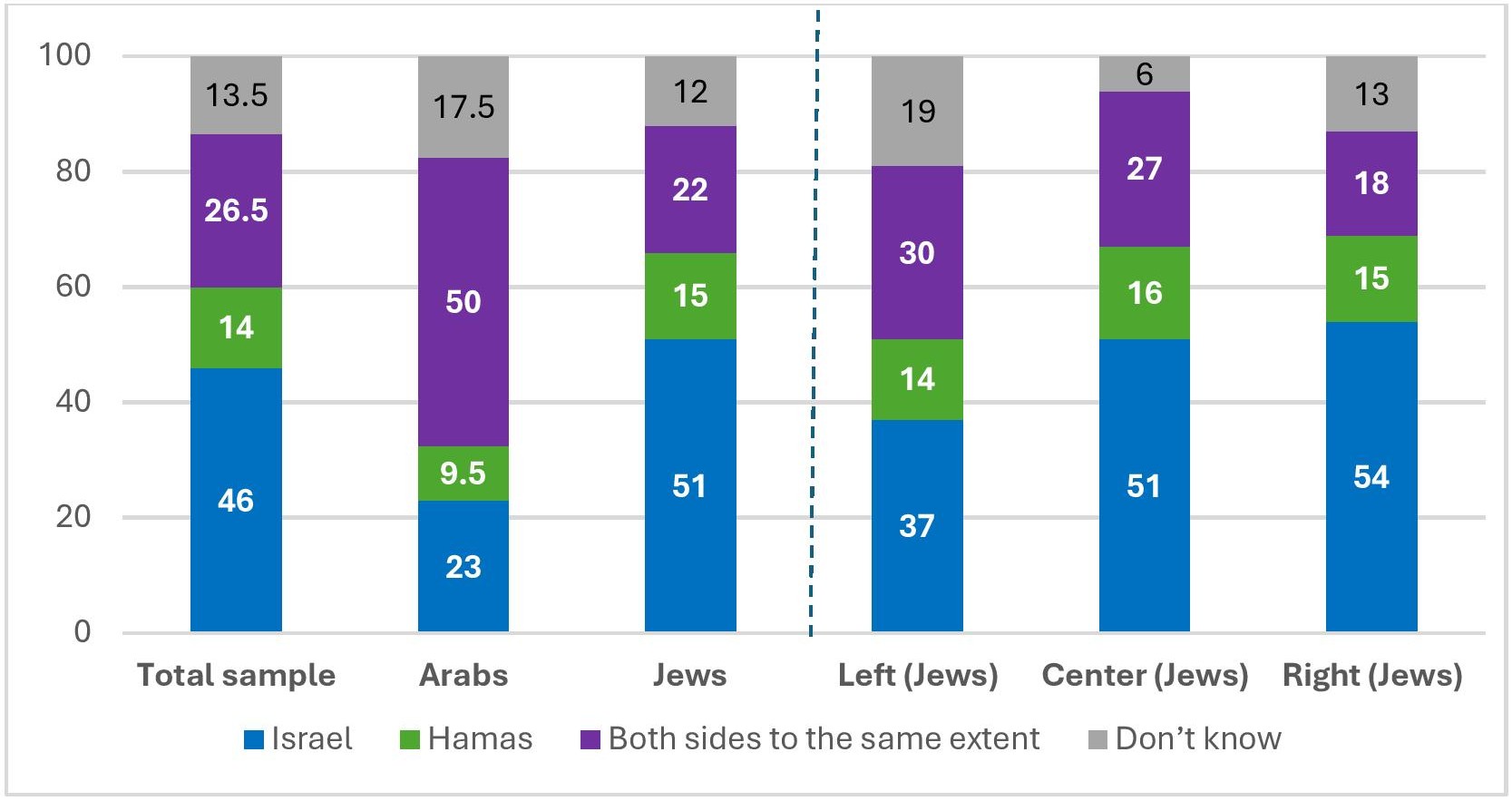
- A clear majority of the total sample (61%) think that a similar agreement could have been reached sooner. The difference between Jews and Arabs is large: a modest majority of Jews (57%) thinks this was possible before, compared to a very large majority of Arabs (81%).
- We also found large disparities between political camps (Jews): While on the Left and in the Center, a large majority think that a similar agreement could have been reached earlier (93% and 75%, respectively), less than half of those on the Right (44%) hold the same view.
Think it was possible to have reached a similar agreement at an earlier stage of the war (%)
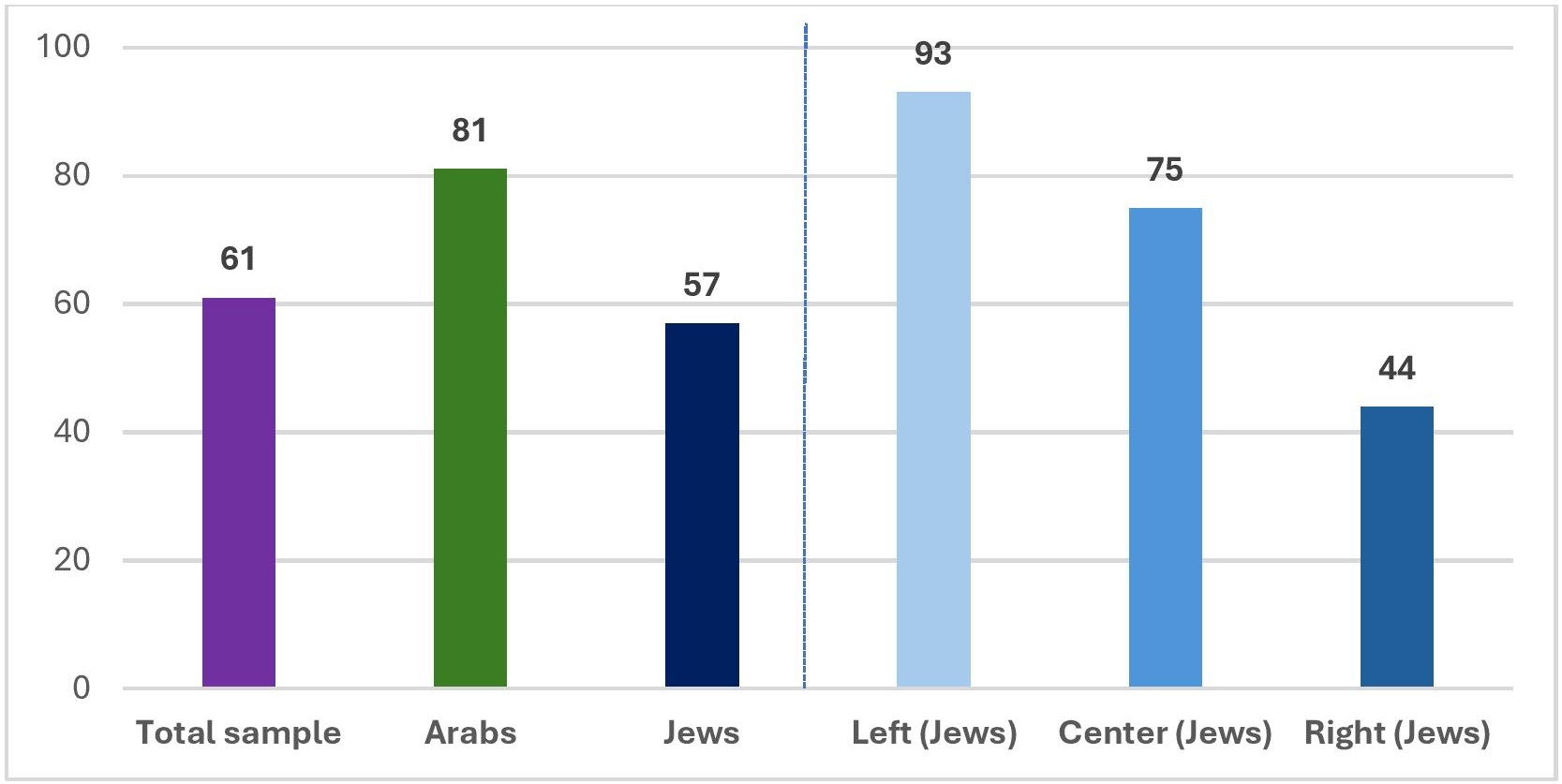
Among Jews, there is a preference for harsh measures in the event that Hamas violates its commitments regarding the return of the bodies of hostages. In the Arab public, the preference is to maintain the commitment to implementing the agreement.
- In the total sample, we found near equality between those who think that Israel should resume military action if Hamas does not meet its obligations under the agreement regarding the return of the dead hostages (39%), and those who think it should impose tighter sanctions and restrict the entry of humanitarian aid into the Gaza Strip (37%). Only a small percentage (15%) think that priority should be given to the continued implementation of the agreement.
- The difference in views between Jews and Arabs is very large: Among Jews, the largest proportion favor a return to direct warfare if Hamas does not meet its obligations (45%) or the imposition of stronger sanctions (42%). Only 6% would prioritize continued implementation of the agreement. By contrast, the majority of Arabs (56%) support continued implementation, and only small proportions prefer harsher sanctions and the restriction of humanitarian aid (12.5%) or a return to hostilities (10%).
- On the Left and in the Center (Jews), the preference is for stronger sanctions and restrictions on humanitarian aid (51% and 55%, respectively). On the Right, the main preference is a return to military action (57%) if Hamas does not meet its commitments regarding the release of the bodies of hostages.
If Hamas does not fulfill its commitment to return the bodies of hostages it is holding, what do you think should guide Israel’s response? (%)
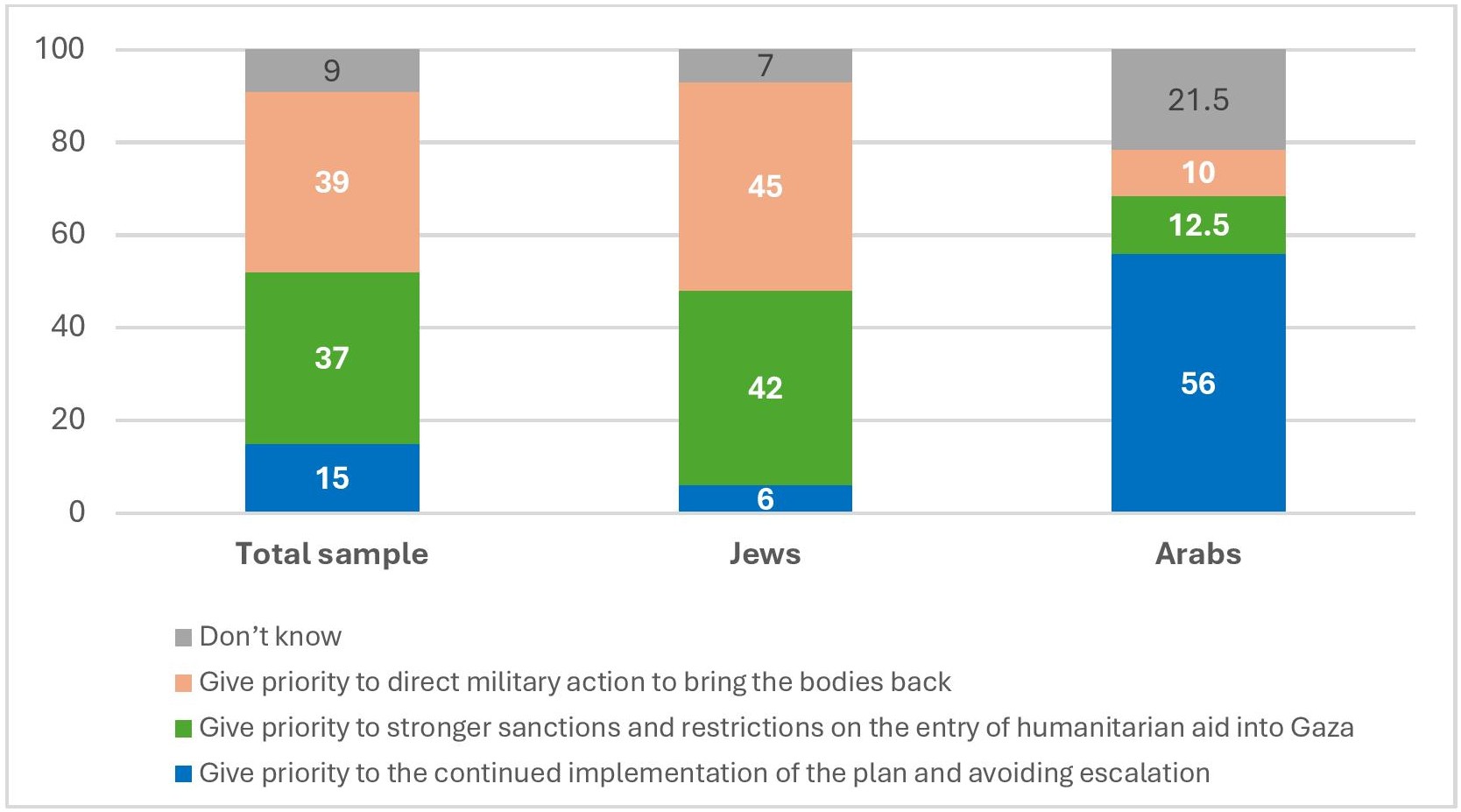
We found public support for the suggestion that the possibility of progressing to stage 2 of the agreement should influence the way in which Israel responds to violations by Hamas.
- In the total sample, around half think that this prospect should indeed affect the way Israel handles violations by the other side (48.5%). A third (33%) think that the possibility of progressing to the next stage should not influence Israel’s response to violations. On this question, a particularly high percentage of respondents selected the "don't know" option (18.5%).
- The difference between Jews and Arabs on this issue is relatively small. Segmentation by political orientation (Jews) reveals a small majority on the Left and Center who think that the desire to advance to stage 2 should influence Israel’s response to violations (59% and 54%, respectively). On the Right, less than half take the same view (46%).
Should the possibility of progressing to stage 2 of the Trump plan, which includes regional normalization, influence or not influence the way in which Israel responds to violations of stage 1 of the agreement by Hamas? (total sample; %)
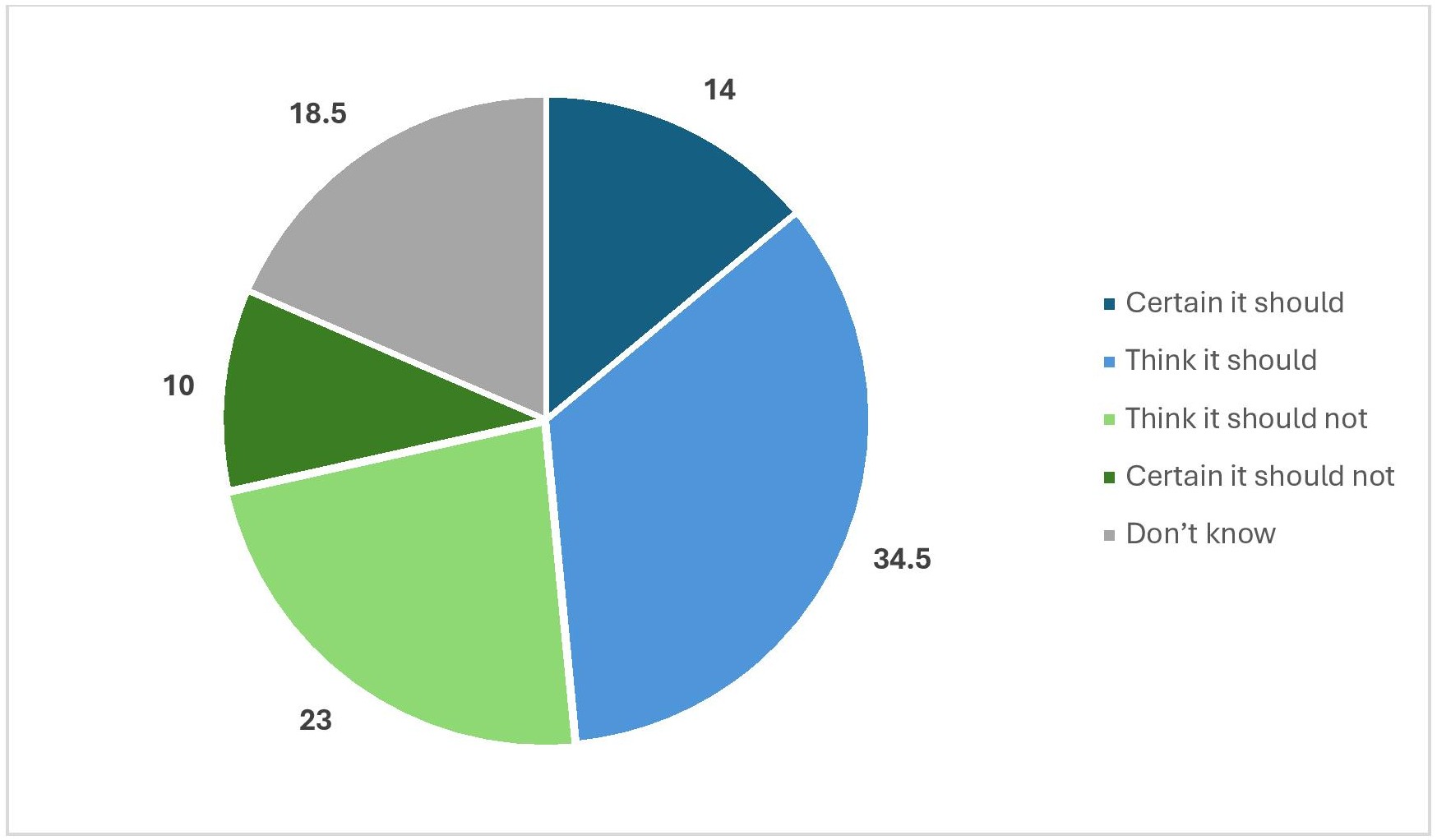
There is little belief among the Israeli public that the next stage of the agreement, which includes distancing Hamas from control of Gaza and establishing a multinational ruling body, will be implemented soon.
- The majority of Jews (72.5%) rate the likelihood of this happening as fairly low or very low (Left, 84%; Center, 72%; Right, 71%).
- The Arab respondents are divided on this issue (high likelihood, 37%; low likelihood, 37%; don’t know, 26%).
Think there is a low likelihood that the next stage of the agreement, which includes distancing Hamas from control of Gaza and establishing a multinational ruling body, will be implemented soon (%)
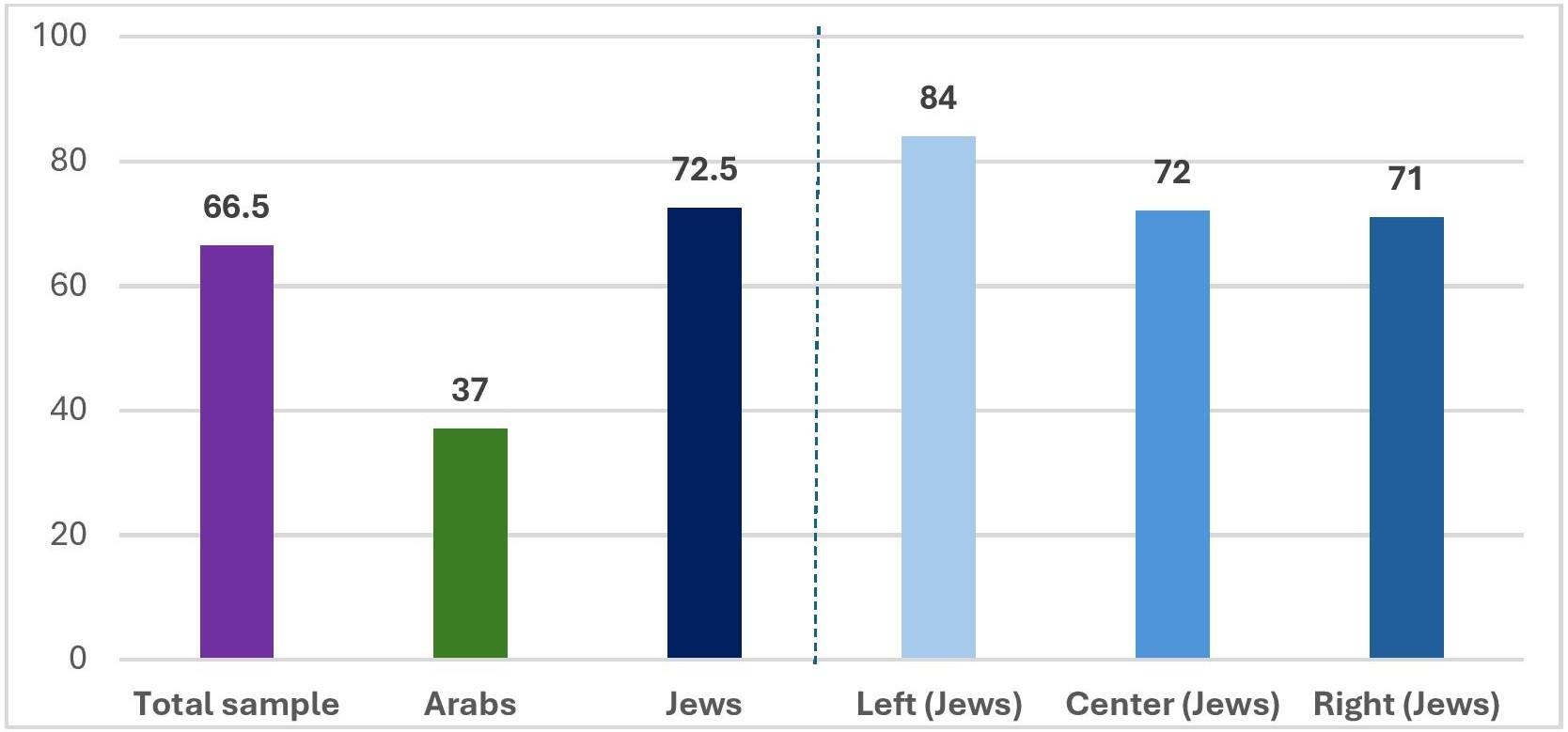
There is a moderate degree of expectation that the signing of the agreement and the ceasefire in Gaza will help improve Israel’s international standing in the foreseeable future.
- In the total sample, a small majority (52%) think that the agreement will help improve Israel’s international standing to a fairly large or very large extent, while 39% think it will do so to a small extent or not at all.
- Among Jews, 53% expect an improvement in Israel’s international standing, compared with 47% of Arabs.
- The assessments of the three political camps (Jews) are very similar, with a small majority in each anticipating an improvement (Left, 54%; Center, 56%; Right, 52%).
In your estimation, to what extent will the signing of the agreement and the ceasefire help improve Israel’s international standing in the foreseeable future? (%)
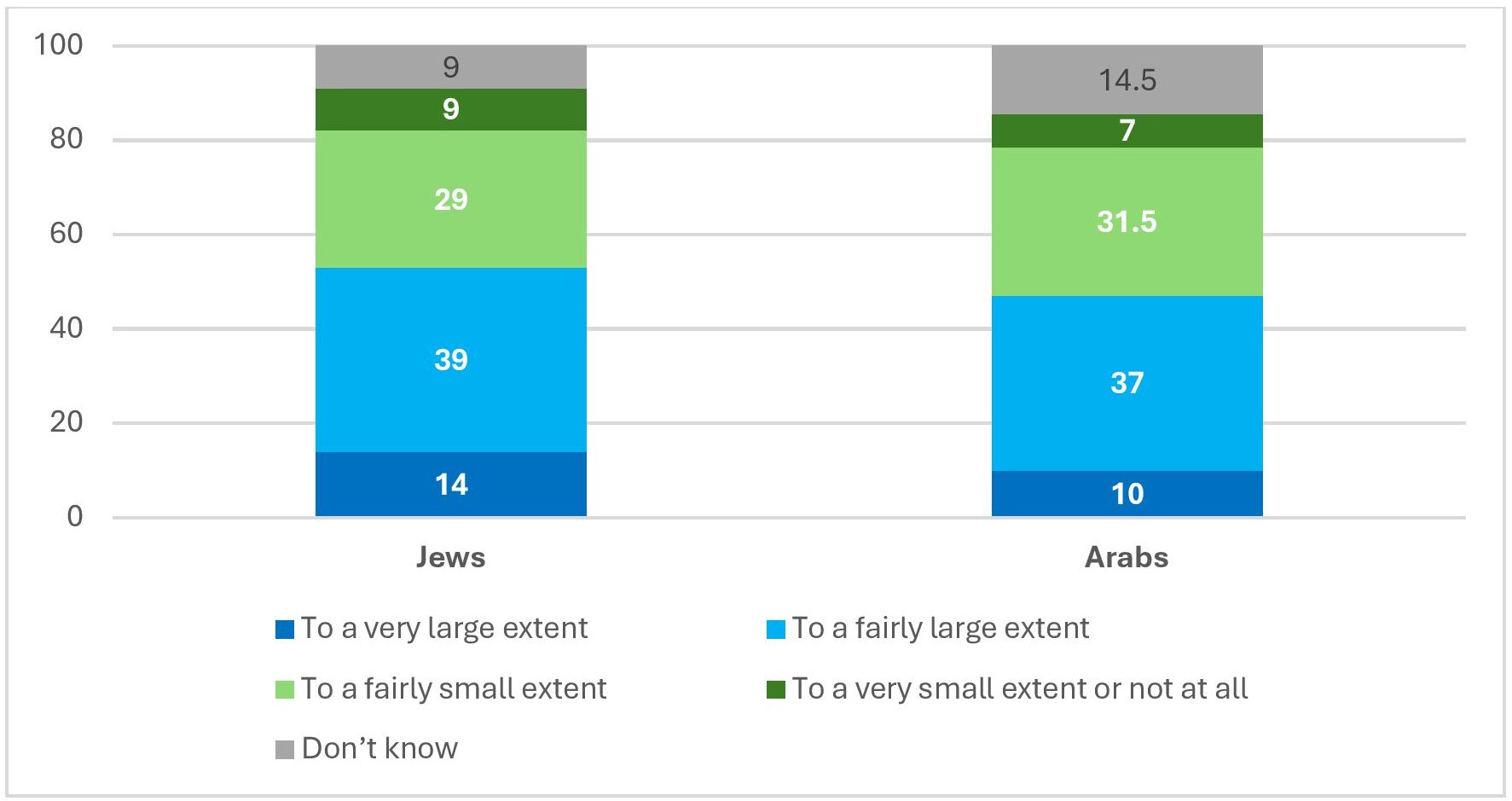
There is general pessimism about the prospects of reaching a regional peace agreement, which would also include a political settlement with the Palestinians, in the foreseeable future.
- A clear majority of the Israeli public (81%) are pessimistic about the likelihood of reaching a regional peace agreement in the foreseeable future.
- The majority of pessimists is much larger among Jews (85%) than among Arabs (61%).
- In all three political camps (Jews), the majority are pessimistic about the chances of reaching a regional peace agreement in the foreseeable future, but this majority is slightly smaller on the Left than in the Center and on the Right (69%, compared with 84% and 89%, respectively).
Think there is a low likelihood in the foreseeable future of reaching a regional peace deal that will also include an agreement with the Palestinians (%)
